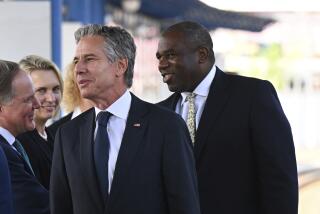Getting U.S. weapons to Syria rebels will take weeks
WASHINGTON — Delivering weapons and ammunition to beleaguered Syrian rebels will take weeks, White House officials acknowledged Friday as the administration’s decision to supply arms set off a debate about how far, and how fast, President Obama’s plunge into the conflict will take him.
The move, after months of hesitation, has been widely viewed as a possible turning point toward far greater U.S. involvement in the 2-year-old civil war. But the decision faces a host of difficulties — logistical, political and diplomatic.
Details on which weapons Obama will send the rebels have not been disclosed. Privately, some officials said the administration might provide the antitank weapons that rebels have been demanding but would not supply the much-sought-after antiaircraft systems. Administration officials have expressed concern that these sophisticated weapons could fall into the hands of Islamic extremists, threatening civilian and military aircraft.
“You need to have some sense of where any assistance you’re providing is going, whose hands they’re falling into and what potential dangers may be associated with heavier weapons systems,” Deputy National Security Advisor Ben Rhodes told reporters Friday.
A White House official, who declined to be identified because of the sensitivity of the issue, said the arms would be delivered within weeks, not months.
However, the administration has moved slowly on its previous commitment to deliver food and nonlethal supplies to opposition groups. It is only now beginning the formal process of notifying Congress about the aid it promised the opposition in April.
Rhodes said U.S. officials had greatly improved their ability to reach the opposition with supplies. Yet “it obviously takes time from a decision for that assistance to reach people in Syria,” he said.
Even if arms do begin flowing soon, it will take CIA trainers weeks to teach the rebels how to use the sophisticated weaponry, said a U.S. military officer involved in the planning.
Political and military divisions within rebel ranks might also prove problematic to U.S. attempts to influence the conflict, some analysts said.
Joshua Landis, a veteran Syria watcher at the University of Oklahoma, said he considered the administration’s move “foolish” because of the limitations of the rebel militias, adding that it was unlikely to do much to turn the tide of the war.
“Obama has spent two years trying not to get into Syria, and now he’s been dragged in,” Landis said in a phone interview from Beirut.
“He has to turn these Keystone Cops into a fighting force that’s competent and not going to carry out massive human rights violations,” he said. “There are thousands of rebel groups, and so far they have shown nothing but incompetence.”
Within the administration, several officials have made similar arguments over the last two years.
The latest round of internal meetings took place in recent weeks as rebel forces were defeated in a battle around the strategic town of Qusair and faced renewed attacks in the northern city of Aleppo.
U.N. Ambassador Susan Rice, who will soon become Obama’s national security advisor, joined Secretary of State John F. Kerry in arguing for a more active U.S. role, officials said. Thomas Donilon, the current national security advisor, was a voice of caution, officials said, although not necessarily a “no” vote on the decision to provide arms.
One recurring issue has been the ultimate goal of U.S. policy: whether to secure a rebel victory or to apply just enough pressure to force the government of President Bashar Assad to enter negotiations.
Najib Ghadbian, head of the Washington office of the Syrian National Coalition, an opposition umbrella group, said the White House may have announced its support for expanding military aid in part to pressure Russia to support diplomatic efforts to reach a negotiated settlement.
If so, the initial Russian response was disappointing.
After discussing the arms decision with Kerry on Friday, Russian Foreign Minister Sergei Lavrov said in a statement that any such move “is fraught with danger of escalation in the region, whereas the accusations of Damascus using chemical weapons put forth by the USA are not backed by credible facts.”
In announcing the decision to send further aid to the rebels, administration officials said Thursday that U.S. intelligence had concluded with “high confidence” that the Syrian government had killed at least 100 civilians in at least eight attacks using sarin, a potent nerve agent.
Alexei Pushkov, chairman of the foreign affairs committee in Russia’s parliament, said that assertion was like Washington’s claim in 2002 that Iraqi President Saddam Hussein had weapons of mass destruction.
“Obama is walking along the path of George Bush,” Pushkov wrote on Twitter.
Obama and European leaders will meet next week with Russian President Vladimir Putin at a gathering in Northern Ireland of the Group of 8 industrialized nations. They are expected to try to change Putin’s mind on Syria.
Several diplomats from allied countries said Friday that they believed it was probably not possible to shift Russia unless the rebels reversed the current direction of the conflict.
Differences also appeared among Washington’s European allies. British Prime Minister David Cameron welcomed the U.S. decision, but the foreign affairs chief for the European Union, Catherine Ashton, was notably reserved.
In a statement, Ashton said the U.S. conclusions about the use of chemical weapons were cause for alarm. But she stopped short of endorsing any moves to start dispatching weapons to the rebels.
“These developments only reinforce the importance of a political solution and should accelerate the efforts of the international community to find a definitive solution to the conflict,” she said.
Even if an international consensus on negotiations develops, that may have limited influence on Assad, said Tamara Cofman Wittes, senior fellow and director of the Saban Center for Middle East Policy at the Brookings Institution.
“If the goal is limited to addressing the military imbalance to make way for a negotiated settlement, I fear they may be disappointed. For Assad, this is an existential struggle, and the fighting will likely intensify,” said Wittes, who was a senior State Department official during Obama’s first term.
Friday, opposition leaders connected with the Supreme Military Council, which the U.S. considers a moderate group, welcomed the promise of aid, but some said they had not been given details about the types and quantities of weapons they would receive or how quickly the shipments would begin.
“Time is of the essence,” Ghadbian said. “They know very well what the SMC needs, and we would like to see the immediate details of such military assistance.”
Ghadbian said the U.S. decision could have the benefit of persuading governments that have been reluctant to provide the rebels with sophisticated arms to do so.
Gen. Salim Idriss, the former Syrian army general who heads the SMC, said Friday that his fighters needed weapons soon.
Idriss has implored the U.S. to provide antitank and antiaircraft weapons, as well as better communications gear, to help rebel fighters hold off an offensive by the government and its allies aimed at recapturing Aleppo, the main city of northern Syria.
On Friday, fighting intensified on the edge of rebel-controlled neighborhoods of the city.
One observer who hailed Obama’s decision was former President Clinton, who had criticized Obama at a private meeting Wednesday night for failing to take more aggressive action on Syria.
“It looks to me like this thing is trending in the right direction,” Clinton said on MSNBC.
Times staff writers Kathleen Hennessey in Washington, Alexandra Zavis in Los Angeles and Sergei L. Loiko in Moscow contributed to this report.
More to Read
Sign up for Essential California
The most important California stories and recommendations in your inbox every morning.
You may occasionally receive promotional content from the Los Angeles Times.













